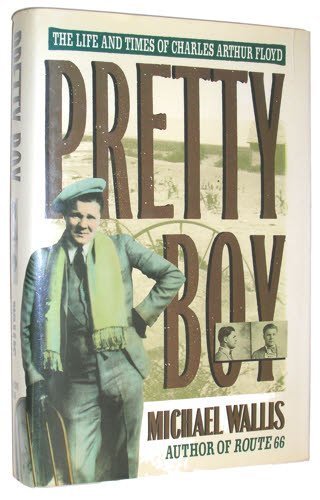Synopsis
A biography of the one of America's most notorious criminals describes "Pretty Boy" Floyd's coming of age in poverty, his descent into petty crime and bootlegging, his stormy marriage, his murders, his jail terms, and more. 60,000 first printing. $50,000 ad/promo.
Reviews
Delivering more than an outstanding biography of Public Enemy No. 1 during the 1930s, Wallis ( Route 66 ) offers exceptional social and regional history as well. Floyd was born in 1904 in northwest Georgia, then still recuperating from Sherman's march to the sea 40 years before. In 1911 his family moved to Oklahoma, where they hoped farming would be less arduous and more rewarding financially, which it was not; the Great Depression began for farmers at the end of WW I, a decade before it struck the rest of the country. A hard-working youth who picked cotton as a child, Charles turned away from a life of unending toil and no money to become "a social bandit," generously spreading funds stolen from banks among family, friends and even strangers. The clannish hill people of Oklahoma looked on him as a hero and hid him from law officers. Finally the FBI declared war on him and he was shot down in Ohio in 1934 while trying to get back to his adopted state, where between 20,000 and 40,000 people attended his funeral. Illustrations.
Copyright 1992 Reed Business Information, Inc.
Strangely written, often exciting life of Depression-era bank- robber/murderer ``Pretty Boy'' Floyd, by the author of Oil Man (1988). Wallis seems bent on drowning his story in southwestern local color and general Americana, with Charles Arthur Floyd not becoming a bandit for nearly 150 pages. The author has a nifty pen and love of the racy phrase, and if you want to know about outlaw culture from Kansas to Oklahoma--when the James brothers rode, and the Daltons, the Youngers, and Belle Starr--and how it bred early 20th- century robbers and later John Dillinger, Bonnie and Clyde, Baby Face Nelson, and Floyd, then this is for you. Floyd's family nickname was ``Choc,'' the word for the mash in the bottom of a barrel of white lightning, which he liked to drink as a youngster on his family's hardscrabble farms in various southern states. Floyd married Ruby Hardgraves when he was 20, she 16 and pregnant. He tried to go straight by earning money following northern harvests, but bitterness set in and he knocked off a St. Louis payroll. Overspending did him in, and he was sent to Missouri State Penitentiary. There, he learned the fine points of being a professional bank robber, a skill he turned to upon his release when his record sank his efforts to get honest jobs. Centering in Kansas City, where a madam gave him the name ``Pretty Boy,'' he set forth on a life of crime that eventually earned him the FBI's top spot as Public Enemy Number One. Floyd's escapes were incredible, as time and again he shot his way out of traps and was kept safe by farm families who loved him as a folk hero. His heists won him peanuts, since country banks had little money. He died at 30, shot in a field by FBI agents. Once underway, plenty of tension, with Floyd a warmhearted badman. (Illustrations--125--not seen.) -- Copyright ©1992, Kirkus Associates, LP. All rights reserved.
Floyd, alias "Pretty Boy," a name familiar to all Americans, was one of the notorious gangsters who roamed the United States in the 1920s and 1930s, committing bank robberies and being romanticized as Robin Hood-like figures. In reality, these "public enemies" were men and women who terrorized and killed many innocent people before coming to untimely ends. Wallis has written a very engaging biography of Floyd, attempting to separate fiction from fact. Floyd, a product of the rural Southwest, grew up like the Joads of The Grapes of Wrath , having to scramble to make a living. Instead of hard work, he chose a life of crime. This choice ultimately put Floyd on a collision course with the fledgling FBI, whose reputation was enhanced by designating and then eliminating "public enemies," including John Dillinger, Baby Face Nelson, and Floyd. Recommended where interest in true crime is high.
- Sandra K. Lindheimer, Middlesex Law Lib., Cambridge, Mass.
Copyright 1992 Reed Business Information, Inc.
"About this title" may belong to another edition of this title.
